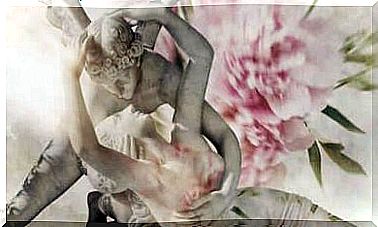The 5 Stages Of Grief – The Kübler-Ross Model

Probably the most well-known theory about how we deal with death is the Kübler-Ross model and the 5 stages of grief. This theory suggests that there are 5 different stages people go through when dealing with death, whether it is their own or one they love. But Kübler-Ross’ studies became very popular and often misinterpreted, probably because they were not always explained accurately.
In 1969, psychologist Elizabeth Kübler-Ross conducted some studies on terminal patients. She wanted to find out what factors come up and affect us when we face death. After a long period of research, she realized that her patients were going through very similar stages. She then began to develop her theory of stages of grief.
In this article, we will try to shed some light on Kübler-Ross’ theory of the stages of grief. To begin with, we will explain each stage. Then we will reflect a little on the evidence that underlies the theory and what it means.

The stages of grief according to Kübler-Ross
The stages of grief incorporate the attitudes people have when confronting death. This is what your mind does while trying to solve the problem. But since it is not a problem that we can solve, our emotions flow over until we reach a stage of acceptance.
- Denial. This means denying or ignoring death when it is near. It can happen in the full sense (“I will not die”) or in a partial sense (“I have cancer, but it is not so dangerous”). Denial is basically your ego that takes a defensive stance. Your mind is trying to find a way to maintain your well-being, even if this is a situation where it is powerless.
- Anger. Anger is an emotion that comes up when we have to face an obstacle. After being told terrible news, it is common for our bodies to try to resolve things through anger. Anger one experiences can have many sacrifices or goals, including yourself, your doctor, or even God.
- Negotiation. When you see that anger can not solve the problem, that is when the negotiation stage begins. You desperately ask for fate or some divinity to make death disappear. It is quite common for people to become “docile” out of a hope that they will live longer by being good. For example, they will follow their medical prescriptions to the letter.
- Depression. Depression occurs when an illness gets worse, or when the awful reality becomes clear. You fall into a severe depression because you feel deeply powerless. But on the other hand, this deep sadness means that you will waste fewer resources on an unsolvable problem.
- Acceptance. Once you have left that feeling of powerlessness, you move on to a much less intense, much more neutral state of mind. But that does not mean you do not still have your moments. When you are in the acceptance stage, you internalize everything that happened and lift your head and look forward to the future. You can also begin to positively interpret the meaning of the loss without blaming anyone.

Proof of the theory and what it means
The Kübler-Ross theory has been criticized. A common, understandable critique has to do with how inflexible the original theory was. According to the first version, if you were to go through these stages, you would have to move on to the next stage, otherwise you would be stuck in the stage you were in. There was no flexibility.
However, current research and perhaps some of your personal experiences show how that is not true. It is common for people to go backwards and skip a stage. There are also people who go through the stages in a completely different order.
Of course, it is still true that all stages play an important role. The stages fit quite well with how most people process grief. But perhaps the best thing would be to interpret the different states of mind as attitudes to loss, not stages.
The Kübler-Ross theory is incomplete, it’s true. But it was a big step forward in our understanding of grief. Her research helped us gain a much deeper understanding of the emotions we go through after loss.
As a result, we have been able to treat grieving people better because their emotions are normalized in the model. Her model has also helped psychologists treat expected losses, as in cases of terminal illness.









